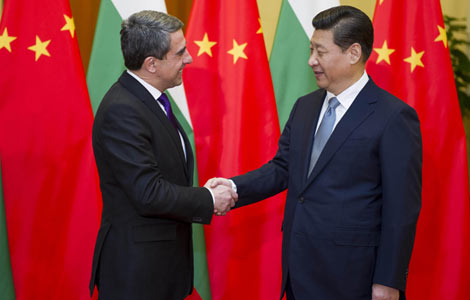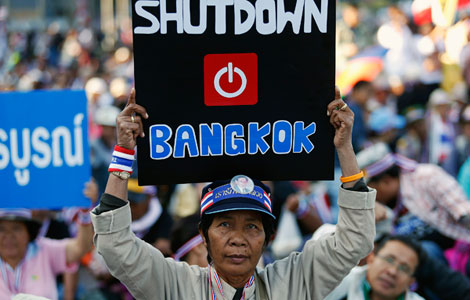Apple is now on Tmall
Updated: 2014-01-15 11:03
By Yu Wei in San Francisco (China Daily USA)
|
||||||||
Seen as another alternative to low priced phones in Chinese market
After announcing its long awaited partnership with China Mobile a few weeks back, Apple is making further moves towards the China market by setting up an official online store on Tmall, China's leading B2C website owned by the country's e-commerce company Alibaba.
The online store on Tmall is Apple's only official online store in China, other than the company's Chinese website, which is considered to be just another channel to reach potential customers.
Ling Zi, a college student from Tianjin, got her iPad Air by ordering it on Tmall.
"It is a pleasant experience. The quality is guaranteed and the delivery was super fast," Ling said.
Ling's first Apple purchase from Tmall also came at a good price. Last Friday, Apple launched a special one-day promotional event for customers in selected Asian markets. Some of its major products were eligible for discounts, including iPhone handsets and iPads. For her 16GB iPad, Ling got 290 yuan off the original price.
"It is not a big discount and the price is still more expensive than the same product sold in Hong Kong, but I'm happy," she said. "Compared to Apple's official website, I'm more familiar with Tmall's shopping mode and that made it more convenient for me."
There is no doubt that China is an important market for Apple and the iPhone maker is continually investing effort there. In addition to opening an official online store on Tmall, Apple opened its fourth store in Beijing last week, bringing the total number of stores in China to ten in four cities.
Last Month, Apple and China Mobile Ltd announced their partnership, with the world's biggest mobile carrier by subscriber base launching the iPhone across the country on Jan 17. The move was considered by many a boost to Apple's Chinese game plan.
"Since Apple has not yet given in to pressure to launch low-priced iPhones, it must focus on other elements of marketing strategy, such as increasing the number of places where the products can be purchased," said Andy Tsay, chair for operations management and information systems at the Leavey School of Business at Santa Clara University.
"The new relationships with China Mobile and Tmall both fall into this category," Tsay said. "These should immediately and dramatically improve Apple's distribution channels in China, which observers and Apple's leaders have long identified as a critical weakness."
Tsay believes people should take a long-term perspective in evaluating the strategic impact of these moves, saying the short-term financial impact might not be too large, since the iPhone 5S and 5C have already been out for several months, from both China Unicom and China Telecom, as well as regular retail channels.
"These two other carriers are apparently already discounting their own iPhone packages to prepare for the new competition. Also, the 4G network, which is a selling point for these phones, is just starting to be rolled out," he explained.
Apple is facing fierce competition in China right now. In the third quarter of 2013, it ranked fifth with 6 percent of China's market, behind Samsung and several Chinese manufacturers that offer inexpensive smart phones, according to research firm Canalys.
"The real question will be whether Apple, after carefully studying the volume and profit impacts of the China Mobile and Tmall relationships, will move any closer to offering significantly lower-priced phones, perhaps China-specific ones, in future product releases," Tsay said. "Until then, Apple will likely continue to fall behind Android in market share."
"Then again, Apple's main objective is not market share, but long-term profitability," he added.
yuwei12@chinadailyusa.com
(China Daily USA 01/15/2014 page2)

 Detroit auto show features fuel-efficient cars
Detroit auto show features fuel-efficient cars
 Palestinian students show military skills
Palestinian students show military skills
 Cristiano Ronaldo wins FIFA best player award
Cristiano Ronaldo wins FIFA best player award
 Xuelong carries on mission after breaking from floes
Xuelong carries on mission after breaking from floes
 Beijing and Sofia vow new initiatives
Beijing and Sofia vow new initiatives
 71st Golden Globe Awards
71st Golden Globe Awards
 Bangkok unrest hurts major projects and tourism industry
Bangkok unrest hurts major projects and tourism industry
 No pant for cold subway ride
No pant for cold subway ride
Most Viewed
Editor's Picks

|

|

|

|

|

|
Today's Top News
Air China ups Houston-Beijing service to daily
Two students hurt in New Mexico school shooting
Chinese have new friend for US tours
15 flu-related deaths reported in Arkansas, US
New workstation in Silicon Valley
At least 16 dead in E China factory fire
Xi calls for reform to fight graft
S. China Sea rules no threat to peace
US Weekly

|

|






